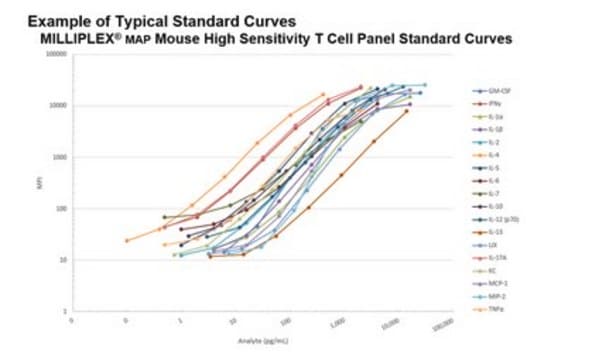MCVD1MAG-77K
MILLIPLEX® Mouse Cardiovascular Disease (CVD) Magnetic Bead Panel 1 - Cardiovascular Disease Multiplex Assay
This MILLIPLEX MAP Mouse Cardiovascular Disease Magnetic Bead Panel 1 includes the following analytes: sE-Selectin, sICAM-1, Pecam-1, sP-Selectin, PAI-1 (total), proMMP-9 & Thrombomodulin.
About This Item
Productos recomendados
Quality Level
species reactivity
mouse
manufacturer/tradename
Milliplex®
assay range
accuracy: 88-99%
sensitivity: 0.008 ng/mL
(proMMP-9)
sensitivity: 0.012 ng/mL
(PAI-1 (total))
sensitivity: 0.012 ng/mL
(Pecam-1)
sensitivity: 0.013 ng/mL
(sICAM-1)
sensitivity: 0.033 ng/mL
(sE-Selectin)
sensitivity: 0.039 ng/mL
(Thrombomodulin)
sensitivity: 0.429 ng/mL
(sP-Selectin)
standard curve range: 0.007-30 ng/mL
(sICAM-1)
standard curve range: 0.012-50 ng/mL
(proMMP-9)
standard curve range: 0.018-75 ng/mL
(PAI-1 (total))
standard curve range: 0.024-100 ng/mL
(Pecam-1)
standard curve range: 0.024-100 ng/mL
(Thrombomodulin)
standard curve range: 0.049-200 ng/mL
(sE-Selectin)
standard curve range: 0.439-1800 ng/mL
(sP-Selectin)
inter-assay cv: <15%
intra-assay cv: <10%
technique(s)
multiplexing: suitable
detection method
fluorometric (Luminex xMAP)
shipped in
wet ice
General description
MILLIPLEX® Mouse CVD Panel 1 is a 7-plex kit to be used for the simultaneous quantification of any or all of the following analytes in serum and plasma samples: sE-Selectin, sICAM-1, Pecam-1, sP-Selectin, PAI-1 Total, proMMP-9, and Thrombomodulin. This kit uses a 96-well format, contains a lyophilized standard cocktail, two internal assay quality controls and can measure up to 38 samples in duplicate.
The Luminex® xMAP® platform uses a magnetic bead immunoassay format for ideal speed and sensitivity to quantitate multiple analytes simultaneously, dramatically improving productivity while conserving valuable sample volume.
Panel Type: Cardiovascular
Specificity
Non-detectable within the panel
Application
- Analytes: CD31 (sPecam-1), sE-Selectin, sICAM-1, PAI-1 (Total), ProMMP-9, sP-Selectin,
- Thrombomodulin, s Recommended Sample Type: Mouse serum, plasma or cell/tissue culture supernatants or lysates
- Recommended Sample Dilution: 25 μL per well of 1:20 diluted serum or plasma; cell/tissue culture samples may require dilution in appropriate control mediumAssay Run Time: Overnight (16-18 hours) at 2-8°C
- Research Category: Cardiovascular Disease
- Research Subcategory: Metabolism
Features and Benefits
Other Notes
Legal Information
Disclaimer
signalword
Danger
Hazard Classifications
Acute Tox. 3 Dermal - Acute Tox. 4 Inhalation - Acute Tox. 4 Oral - Aquatic Chronic 2 - Eye Irrit. 2 - Skin Sens. 1
Storage Class
6.1C - Combustible acute toxic Cat.3 / toxic compounds or compounds which causing chronic effects
Certificados de análisis (COA)
Busque Certificados de análisis (COA) introduciendo el número de lote del producto. Los números de lote se encuentran en la etiqueta del producto después de las palabras «Lot» o «Batch»
¿Ya tiene este producto?
Encuentre la documentación para los productos que ha comprado recientemente en la Biblioteca de documentos.
Nuestro equipo de científicos tiene experiencia en todas las áreas de investigación: Ciencias de la vida, Ciencia de los materiales, Síntesis química, Cromatografía, Analítica y muchas otras.
Póngase en contacto con el Servicio técnico








